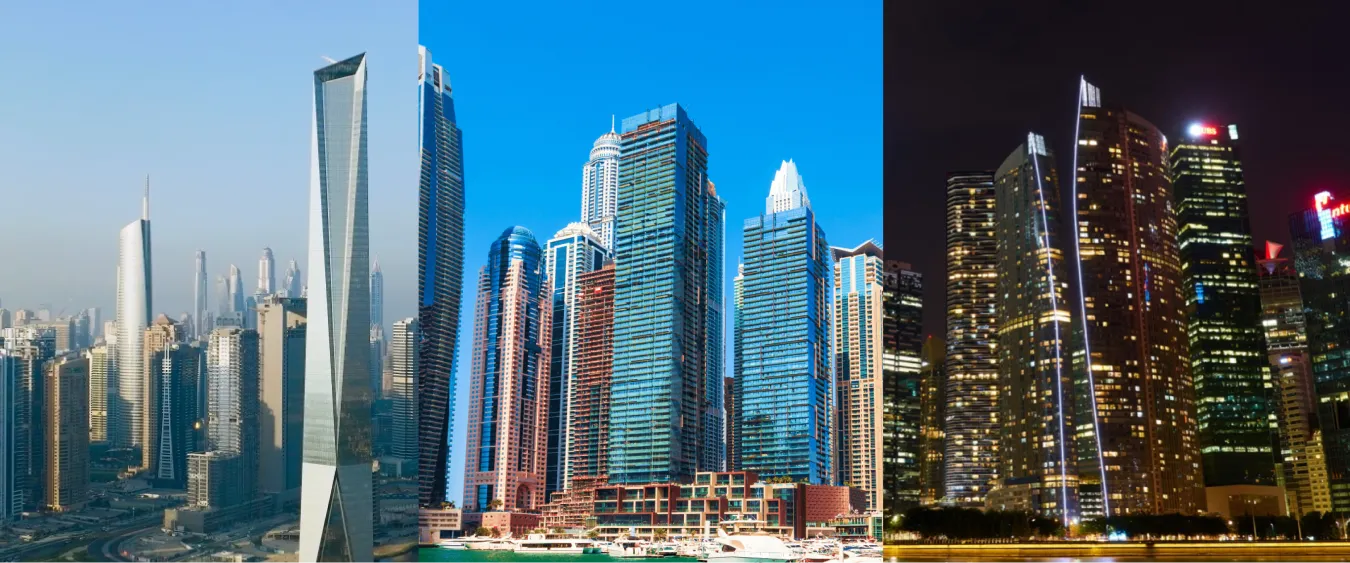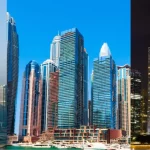“Want to launch a business in one of the world’s most dynamic cities, but don’t know where to start? Well, Dubai opens the doors, but you’ll need to pick the right jurisdiction first!”
If you are looking for ways of company formation in Dubai, it is good to know the procedure first. UAE has several setup options, such as Mainland, Free Zone, and Offshore. Each structure has its own regulations, advantages, and expenses. Nevertheless, selecting an appropriate jurisdiction will determine the destiny of your business growth.
As reported by Gulf Business, the Dubai Free Zones Council predicted that Free Zones will add around AED 250 billion to the GDP of Dubai through 2030, underlining their growing economic significance in the emirate. This projection emphasizes having your business model, legal jurisdiction, and banking strategy in alignment from the beginning, as part of an intelligent company setup.
We at KINZAAD strive not only to have your company formation process compliant but also smooth and hassle-free. After setting up, we’re here to serve you through your business journey, making sure you’re properly prepared to excel in Dubai’s fast-paced, multicultural business environment.
Do not miss the useful information in this blog. Continue reading and you will gain a comprehensive understanding of the various company forms in Dubai, enabling you to make a well-informed choice that will be in your business interests. Stay tuned!
Table of Contents
ToggleWhat are the Three Jurisdictions?
One of the first decisions you will make when setting up a company in Dubai is choosing the jurisdiction. Each has rules, benefits, and limitations. Here’s a brief overview:
Mainland
This structure is administered by Dubai’s Department of Economy and Tourism (DET). It allows you to do business anywhere in the UAE and have direct business with local customers. Foreign ownership of most activities is allowed up to 100%, so it is a suitable choice for trade or service businesses.
Free Zone
Free Zones are dedicated economic areas like DIFC, DMCC, or JAFZA. They offer benefits such as full foreign ownership, zero personal tax, and quick setup processes. However, if you want to sell directly in the UAE market, you’ll need to work with a local distributor or open a mainland branch.
Offshore
Offshore businesses are best suited for international trade, asset protection, or holding. They cannot do business within the UAE or rent physical office space. This model is best if your company is based out of the region and does not require a local presence.
Mainland vs Free Zone vs Offshore [Key Comparison]
Let’s compare all three main jurisdictions for better understanding and more clarity through the key factors stated below:
| Feature | Mainland | Free Zone | Offshore |
| Regulatory Authority | DET | Specific Free Zone Authority | RAK ICC, JAFZA Offshore, etc. |
| 100% Foreign Ownership | Yes (selected activities) | Yes | Yes |
| UAE Market Access | Full | Restricted (via distributor) | Not allowed |
| Office Requirement | Mandatory | Shared/Flexi-desk options available | Not required |
| Visa Eligibility | Yes | Yes | No |
| Bank Account | Yes | Yes | Limited |
| Setup Cost (Approx.) | AED 15K–30K | AED 12K–30K | AED 5K–15K |
Mainland Company Setup in Dubai
Dubai mainland company establishment is governed by the Department of Economy & Tourism (DET) and is suitable for companies that wish to target the UAE market without any limitation.
If you are wondering about what the mainland is in UAE, it is the central commercial area where companies can conduct activities anywhere within the nation without a local distributor or agent.
This establishment is best for service providers, trading locally, tourism, construction, and businesses targeting government tenders.
Benefits:
- Run without geographical limitations.
- Have unlimited visa quotas (depending on office size)
- Qualified for government contracts and public sector projects
Mainland businesses can also establish offices in any emirate and tender for projects throughout the UAE with complete flexibility and scalability.
Free Zone Company Setup in Dubai
Free Zone companies are established within one of the 45+ dedicated economic zones such as DMCC, DIFC, or Dubai South. It is ideal for those wondering what a Free Zone company in Dubai is in layman’s terms.
Free Zones operate to attract global investors with 100% ownership, tax benefits, and streamlined company setup processes.
Benefits
Starting your company in a Dubai Free Zone offers several benefits that streamline processes and lower costs:
- No customs taxes will be levied whether trading domestically or internationally inside the Free Zone.
- Paperwork and a few regulatory measures define the registration process.
- Free Zones provide several license kinds, including service, trade, e-commerce, and other options.
- You can sponsor staff members, visit contemporary coworking venues, and take advantage of a business-friendly environment with fewer bureaucratic obstacles.
A common query is how Free Zone companies vary from those of the Mainland. The primary distinction is market access. Free Zone businesses have to either create a mainland branch or collaborate with a local distributor to sell directly within the UAE.
Offshore Company Setup in Dubai
Offshore businesses in Dubai are designed for global business, asset protection, and wealth management. When you are weighing the alternatives and asking what the difference is between Freezone and Offshore, the distinction comes down to the scope of business and regulatory requirements.
Offshore companies, usually registered as RAK ICC or JAFZA Offshore, can never do business in the UAE or deliver local services.
Good for:
- Holding corporations without physical presence
- Intellectual property and asset management
- International trade or shipping businesses
Offshore companies are not eligible for UAE residence visas and therefore are distinctly separate from Free Zone and Mainland businesses. Offshore structures mainly benefit by avoiding publicity, easy setup, and minimum-cost administration for international operations.
Mainland vs Free Zone vs Offshore 2025 [Cost Comparison]
On the basis of the latest available statistics, the following is an updated and original cost comparison to form a company within Dubai’s Mainland, Free Zone, and Offshore jurisdictions:
| Jurisdiction | License & Setup | Office Rent | Visa (per person) |
| Mainland | AED 15,000–50,000+ | AED 15,000–50,000/year | AED 3,000–6,000 |
| Free Zone | AED 5,750–50,000+ | AED 5,000–100,000/year | AED 4,000–7,000 |
| Offshore | AED 12,500–20,000+ | None | Not applicable |
Note: Costs may vary depending on specific business activities, the number of visas needed, and the selected jurisdiction. It is recommended to consult a business setup expert for getting a customized estimate based on your unique needs.
What are the Visa & Ownership Differences
- Mainland: May grant unlimited employment visas, subject to office size and activity. Governed by DET.
- Free Zone: Restricted visa quotas (usually 1–6). Dubai free zone visa requirements differ according to the authority.
- Offshore: No eligibility for a UAE visa, or local access to operate.
The company visa quota in Dubai varies according to the location of the business and the license granted.
Which Jurisdiction is Right for You?
- Select Mainland if you intend to cater to the local UAE market or bid on government tenders. It is more flexible but has greater regulatory control.
- Go for a Free Zone arrangement if you are targeting e-commerce, consultancy, or import/export, and require easy compliance with 100% ownership.
- Choose Offshore if you require a holding company or conduct business completely outside the UAE but desire Dubai benefits.
FAQs
How are the mainland, freezone, and offshore different?
Mainland companies are able to operate throughout the UAE without any limitations. Freezone companies can only conduct local trade through distributors and provide tax advantages. Offshore companies are for international commerce and do not have a local operating presence in the UAE.
How is a free zone different from a non-free zone?
Free Zones provide 100% foreign ownership and taxation exemption but restrict direct trade on the UAE mainland. Non-free zones, or mainland, provide unrestricted access to the domestic market but can involve a local sponsor or partner.
Is Freezone distinct from DED?
DED regulates mainland companies within the UAE and provides full access to the local market. Free zones, however, are regulated by certain Free Zone authorities and provide advantages such as 100% foreign ownership, but with restrictions on the market.
Is DIFC mainland or a free zone?
DIFC is a free zone with separate regulations, laws, and courts specializing in financial services. It provides 100% foreign ownership and tax incentives but is outside the control of mainland authorities.
Wrap Up
Choosing the right business jurisdiction in Dubai is not a straightforward process. Your optimal configuration depends on your business model, market reach, budget, and growth strategy. This comparison of Dubai company setups enables you to weigh the pros and cons of each option.
If you remain uncertain, getting advice from a business setup specialist can save time, expense, and confusion. With changing laws and licensing reforms, having an informed choice in 2025 is more crucial than ever.
KINZAAD is here to walk you through, from choice to installation. Start your business smartly, confidently, and in compliance.



